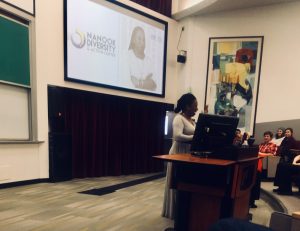- ‘When it’s on you, it’s on you.’ - April 30, 2018
FAIRBANKS-The founder of the “Me Too’ movement, and social justice activist, gave a heartfelt and illuminating talk to a packed UAF auditorium Friday night.
Tarana Burke introduced her life story and what led her to her current work, while dispelling what different news outlets have said about her movement, called the “Me Too’ movement, which went viral on multiple social media outlets in October of 2017. The movement gained momentum amidst a number of high profile assault and rape accusations targeting big names in Hollywood, including Harvey Weinstein.
Burke’s talk, however, dove deeper than repeating news outlets’ oft-repeated headlines. She touched on how to approach a sexual assault victim, her personal values and beliefs about survivors, and even her opinion on sexual education in schools.
Burke also cautioned against assuming the culture has already changed for the better, or shifted, saying, “it hasn’t changed yet. Look at the numbers.’ She is referring to sexual assault and violence statistics, and she is right. RAINN reports that sexual violence has been hovering around 1.6 per 1000 people since 2005, not improving, and while it did dip initially from the late 1990’s, it has not been recently improving.
The bulk of her talk centered around the Me Too movement, and what she says it is and it isn’t. While sharing how it started and the people that contributed to its development, she also described that there are many misunderstandings, ranging from the idea that men can’t be a part of the movement, to the notion the movement is trying to target rich or powerful men. All are things Burke says are not true. She said the movement was for anyone who was the victim of sexual violence, and its purpose was to empower through empathy, and not to take anyone down through accusations.
Malaika Gage, a UAF student, called the session “ eye-opening. Sexual violence is an epidemic in the United States. Alaska has the highest rate of sexual violence and we have to do more to stop this.’

Tarana Burke also made the statement multiple times that “community problems need a community response.’ She used her early career as an example, recalling that in the small town in Alabama where she was employed in a leadership program for children, there was only one rape crisis center to serve the surrounding 11 counties. After hearing many of the kids in her program talk about sexual violence they experienced, she tried to go and ask questions, but the worker told her it was an appointment only center. So Burke did what she termed “filling the gap,’ or trying to find a way to meet the apparent need for something better in her community. She started her own program, with some coworkers, to fill the need for her program’s kids and others experiencing sexual violence. She encouraged the audience to fill gaps in their community, and incite community responses to their collective and unique needs.
There was a wide variety of ages and backgrounds in the crowd, including many students and military members.
Burke was vivacious and had a very sharp sense of humor and wit. For a talk about sexual violence and her work as an informal counselor, the audience was laughing quite a bit.
The talk had far-reaching implications, Gage said. “I was reflecting on my education and we never talked about boundaries and what’s appropriate and what’s not appropriate in sex ed. I think a lot of times schools just expect parents to talk about it but that doesn’t always happen so I feel as a future educator it’s our responsibility to teach students how to have healthy relationships with each other. We also have to teach people at a young age that it’s OK to speak up!’
Burke said that waiting until someone is a freshman in college before teaching appropriate boundaries is too late. She pointed to the Title IX training that students are required to take, noting that once someone is an adult the predatory behavior is already there.
The Nanook Diversity and Action Center sponsored her trip to Fairbanks.
Overall, her talk focused on empowerment, for both survivors and advocates. She cautioned being gentle, and accessing joy, a quality Burke says is what surviving looks like for her. She said to know it would look different for everyone. But she was firm in one thing: that there was work to be done. She said this was her work, and she immediately knew it. “When it’s on you, it’s on you.’
